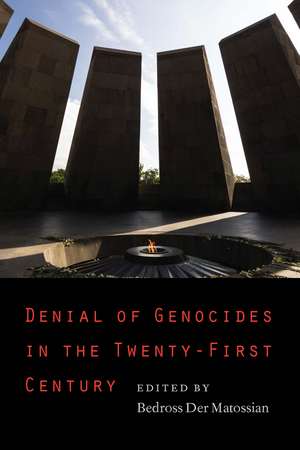Denial of Genocides in the Twenty-First Century
Editat de Bedross Der Matossianen Limba Engleză Hardback – mai 2023
Denial of Genocides in the Twenty-First Century brings together leading scholars from across disciplines to add to the body of genocide scholarship that is challenged by denialist literature. By concentrating on factors such as the role of communications and news media, global and national social networks, the weaponization of information by authoritarian regimes and political parties, court cases in the United States and Europe, freedom of speech, and postmodernist thought, this volume discusses how genocide denial is becoming a fact of daily life in the twenty-first century.
Preț: 423.87 lei
Preț vechi: 523.30 lei
-19% Nou
Puncte Express: 636
Preț estimativ în valută:
81.11€ • 83.80$ • 67.47£
81.11€ • 83.80$ • 67.47£
Carte disponibilă
Livrare economică 27 februarie-13 martie
Livrare express 12-18 februarie pentru 41.85 lei
Preluare comenzi: 021 569.72.76
Specificații
ISBN-13: 9781496225108
ISBN-10: 1496225104
Pagini: 416
Ilustrații: 5 photographs, 2 illustrations, 1 table, index
Dimensiuni: 152 x 229 x 33 mm
Greutate: 0.78 kg
Editura: Nebraska
Colecția University of Nebraska Press
Locul publicării:United States
ISBN-10: 1496225104
Pagini: 416
Ilustrații: 5 photographs, 2 illustrations, 1 table, index
Dimensiuni: 152 x 229 x 33 mm
Greutate: 0.78 kg
Editura: Nebraska
Colecția University of Nebraska Press
Locul publicării:United States
Notă biografică
Bedross Der Matossian is an associate professor of modern Middle East history and the Hymen Rosenberg Associate Professor in Judaic Studies at the University of Nebraska–Lincoln. He is the author of The Horrors of Adana: Revolution and Violence in the Early Twentieth Century and Shattered Dreams of Revolution: From Liberty to Violence in the Late Ottoman Empire.
Cuprins
List of Illustrations
Acknowledgments
Introduction: Genocide Denial in the Twenty-First Century
Bedross Der Matossian
1. Denial of Genocide of Indigenous People in the United States
Robert K. Hitchcock
2. Armenian Genocide and Its Denial: A Comprehensive Tool of Supremacism?
Talin Suciyan
3. Weaponizing the First Amendment: Denial of the Armenian Genocide and the U.S. Courts
Marc A. Mamigonian
4. Coalition Politics and Parliamentary Paralysis: The Armenian Genocide Bill during the Netanyahu Administration, 2009–2021
Eldad Ben Aharon
5. Denying the Shoah: Distorting History in the Twenty-First Century
Gerald J. Steinacher
6. Aversions to Acknowledging the Khmer Rouge Genocides in Cambodia, 1990–2021
Ben Kiernan
7. Denial of the Guatemalan Genocide, 1981–2020
Samuel Totten
8. Regional Political Implications of Bosnian Genocide Denial
Jelena Subotić
9. Mainstreaming the Denial of the Genocide against the Tutsi
Roland Moerland
10. A Multifront War of Narratives: The Assad Regime’s Emerging Denialism
Uğur Ümit Üngör and Annsar Shahhoud
Epilogue: Denials of Reality Remove the Capacity to Think Straight and Logically in Order to Feel Protected and Safe
Israel W. Charny
Contributors
Index
Acknowledgments
Introduction: Genocide Denial in the Twenty-First Century
Bedross Der Matossian
1. Denial of Genocide of Indigenous People in the United States
Robert K. Hitchcock
2. Armenian Genocide and Its Denial: A Comprehensive Tool of Supremacism?
Talin Suciyan
3. Weaponizing the First Amendment: Denial of the Armenian Genocide and the U.S. Courts
Marc A. Mamigonian
4. Coalition Politics and Parliamentary Paralysis: The Armenian Genocide Bill during the Netanyahu Administration, 2009–2021
Eldad Ben Aharon
5. Denying the Shoah: Distorting History in the Twenty-First Century
Gerald J. Steinacher
6. Aversions to Acknowledging the Khmer Rouge Genocides in Cambodia, 1990–2021
Ben Kiernan
7. Denial of the Guatemalan Genocide, 1981–2020
Samuel Totten
8. Regional Political Implications of Bosnian Genocide Denial
Jelena Subotić
9. Mainstreaming the Denial of the Genocide against the Tutsi
Roland Moerland
10. A Multifront War of Narratives: The Assad Regime’s Emerging Denialism
Uğur Ümit Üngör and Annsar Shahhoud
Epilogue: Denials of Reality Remove the Capacity to Think Straight and Logically in Order to Feel Protected and Safe
Israel W. Charny
Contributors
Index
Recenzii
"Der Matossian's Genocide Denial in the Twenty-First Century is essential reading as it keeps horrific losses from genocide at the forefront of our memories, while expanding our understanding of the myriad ways in which genocide has been and continues to be denied."—Jeff Bachman, H-Diplo
"An extremely important book."—J. A. Drobnicki, Choice
“An understanding of denial is essential to an understanding of genocide. This book makes a powerful contribution to the field. It is admirably wide-ranging and comparative. Each chapter is engaging, compelling, and thought-provoking—perhaps not surprising given the eminence and reputations of its contributors.”—John Cox, author of To Kill a People: Genocide in the Twentieth Century
“Providing an updated and comprehensive analysis of the ongoing phenomenon of genocide denial and its origins, motivations, and repercussions by experts in the field, this volume clarifies the prevalent and lamentable practice of both perpetrating mass murder and erasing its memory.”—Omer Bartov, author of Anatomy of a Genocide: The Life and Death of a Town Called Buczacz
“With chapters by leading scholars, this volume provides key insights about how genocide denial has played out in some of the major cases of our times. It is a welcome and much-needed addition to the field of genocide studies.”—Alexander Laban Hinton, author of It Can Happen Here: White Power and the Rising Threat of Genocide in the U.S.
“Extremely important and urgent. As we, scholars and the public, are faced with rising denialist attempts in various countries regarding various genocides, this volume [is a] very timely and an important contribution to a developing subfield of genocide studies and political education. Denial of genocide in itself and also in its comparative perspective is still relatively under-researched.”—Stefan Ihrig, author of Justifying Genocide: Germany and the Armenians from Bismarck to Hitler
Descriere
This volume brings together leading scholars from across disciplines to discuss genocide denial in the twenty-first century, concentrating on communication, social networks, and public spheres of daily life.
